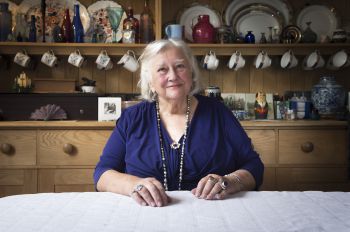Obituary: Professor Maggie Boden
Posted on behalf of: Communications
Last updated: Monday, 28 July 2025

Professor Margaret (Maggie) Boden
The University of Sussex mourns the loss of Professor Margaret (Maggie) Boden who passed away recently at the age of 88. A pioneering figure in cognitive science and artificial intelligence, Maggie’s life and academic career were indelibly linked to the University.
Born in 1936, Maggie’s intellectual journey spanned disciplines and continents - from medical sciences at Cambridge to philosophy and psychology at Harvard. Initially, she wanted to be a psychiatrist. In an interview with University writer Jacqui Bealing in 2018 she said: “I was fascinated by how the body worked, how the human mind worked and what was going on when it went wrong in various ways.” Following undergraduate degrees in both medicine and philosophy at Cambridge University, followed by three years teaching philosophy at the University of Birmingham, she went to Harvard University to study psychology, and realised that she was in a position to bring together these academic disciplines in a unique way.
In 1965 Maggie arrived at Sussex as a lecturer in philosophy, and over the decades her contributions to the University were both academic and institutional. Her work bridged psychology, philosophy, and computer science, and helped shaped Sussex’s reputation as a hub for interdisciplinary research. She served as Dean of the School of Social Sciences, and in the early 1970s she played a central role in establishing first the Cognitive Studies Programme, and then the School of Cognitive and Computing Studies, becoming its founding Dean. COGS, as it came to be known, lives on at Sussex as the Centre for Cognitive Science, which is housed in the School of Informatics and Engineering and continuing to bring researchers together from across the disciplines.
Maggie played a crucial part in early and career-long discussions on the risks and benefits of AI, as well producing seminal work to define and nurture the area of computational creativity and creative cognition. She was very proud to receive the ACM AAAI Allen Newell Award in 2017 recognising her work in this area.
At Sussex, Maggie’s visionary interdisciplinary thinking flourished, and she taught and inspired generations of students, remaining Research Professor of Cognitive Science at Sussex well into her later years. A pioneering woman in her field and in academia, she was a lifelong champion for, and inspiration to, her fellow female academics.
Maggie’s many accolades and achievements included an OBE and three honorary doctorates. She was vice-president of the British Academy, chair of the Council of The Royal Institution, and profiled on BBC Radio 4’s ‘The Life Scientific’. She was also a celebrated author whose books have been translated into more than 20 languages.
Vice-Chancellor, Professor Sasha Roseneil said: “This is a very sad moment as we have lost a huge figure in the Sussex’s history. The University and the wider academic world have been profoundly shaped by Maggie’s brilliant and innovative thinking, and the truly ground-breaking interdisciplinarity that she developed and nurtured so carefully here at Sussex is just part of her tremendous legacy.”

